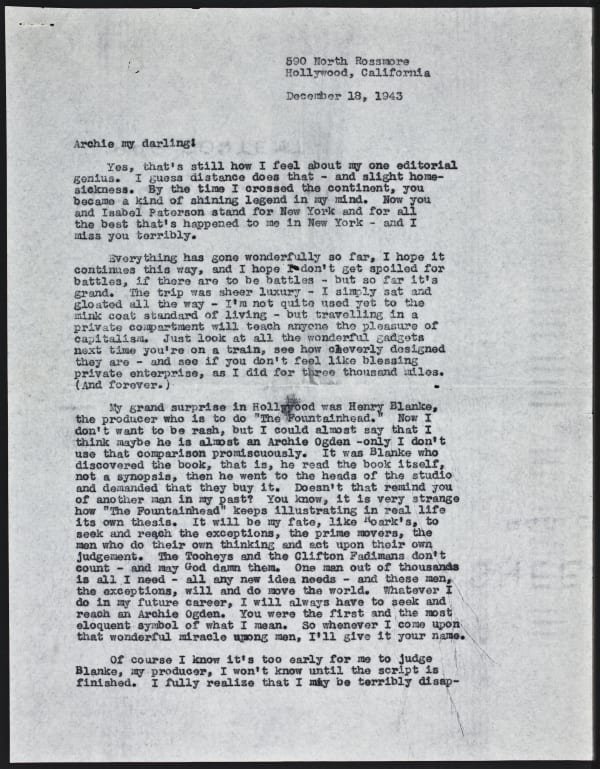
[Page 1]
590 North Rossmore
Hollywood, California
December 18, 1943
Archie my darling!
Yes, that’s still how I feel about my one editorial genius. I guess distance does that—and slight homesickness. By the time I crossed the continent, you became a kind of shining legend in my mind. Now you and Isabel Paterson stand for New York and for all the best that’s happened to me in New York—and I miss you terribly.
Everything has gone wonderfully so far, I hope it continues this way, and I hope I don’t get spoiled for battles, if there are to be battles—but so far it’s grand. The trip was sheer luxury—I simply sat and gloated all the way—I’m not quite used yet to the mink coat standard of living—but travelling in a private compartment will teach anyone the pleasure of capitalism. Just look at all the wonderful gadgets next time you’re on a train, see how cleverly designed they are—and see if you don’t feel like blessing private enterprise, as I did for three thousand miles. (And forever.)
My grand surprise in Hollywood was Henry Blanke, the producer who is to do “The Fountainhead.” Now I don’t want to be rash, but I could almost say that I think maybe he is almost an Archie Ogden—only I don’t use that comparison promiscuously. It was Blanke who discovered the book, that is, he read the book itself, not a synopsis, then he went to the heads of the studio and demanded that they buy it. Doesn’t that remind you of another man in my past? You know, it is very strange how “The Fountainhead” keeps illustrating in real life its own thesis. It will be my fate, like Roark’s, to seek and reach the exceptions, the prime movers, the men who do their own thinking and act upon their own judgement. The Tooheys and the Clifton Fadimans don’t count—and may God damn them. One man out of thousands is all I need—all any new idea needs—and these men, the exceptions, will and do move the world. Whatever I do in my future career, I will always have to seek and reach an Archie Ogden. You were the first and the most eloquent symbol of what I mean. So whenever I come upon that wonderful miracle among men, I’ll give it your name.
Of course I know it’s too early for me to judge Blanke, my producer, I won’t know until the script is finished. I fully realize that I may be terribly disap-
[Page 2]
2.
pointed, that he may not have my ideas at all. It’s possible, but it does not look that way right now. He loves “The Fountainhead”, he admires my style of writing, and he is crazy about Roark. He says there’s no one in Hollywood who can write dialogue as I do. Whatever he decides to do with the story later, this much I can hold to his credit. He told me that he fell in love with the book, that he started reading it and couldn’t put it down and dropped all his other business until he had finished it. I heard a corroboration of this from one of his other writers. Five days after he finished the book, Warners had bought it.
I am to write my own screen version as I please. This doesn’t mean that it will be the final version—and the battles will probably start after I finish it—but at least I’ll have a chance to present my version. Blanke has given me no[]objections and no restrictions, except on the sex side—we’ll have to be careful of the Hays office and treat such scenes as my famous rape scene through tactful fade-outs.
As to the working conditions of a Hollywood writer’s life—they are exactly as one would imagine a Hollywood writer’s life, with all the trimmings. I have an office the size of a living room, with another office outside and a secretary in it. Nobody can come in without being announced by my secretary and she answers my telephone. The grandeur and the glamor and the pomp and circumstance are simply wonderful. Of course I love it—for the moment. But I won’t exchange it for the pleasure of writing as I please. I haven’t gone Hollywood yet.
As to sunny California—I have a miserable cold and it’s pouring outside. It’s cold, wet and nasty. I hate Hollywood as a place, just as I did before. It’s overcrowded, vulgar, cheap and sad in a hopeless sort of way. The people on the streets are all tense, eager, suspicious and look unhappy. The has-beens and the would-bes. I don’t think anything in the world is worth this kind of struggle.
I miss New York, in a strange way, with a homesickness I’ve never felt before for any place on earth. I’m in love with New York, and I don’t mean I love it, but I mean I’m in love with it. Frank says that what I love is not the real city, but the New York I built myself. That’s true. Anyway, I feel the most unbearable, wistful, romantic tenderness for it—and for everybody in it.
And this means you, to a greater extent than most, since you were the man who let me built my New York. So—all my love to you, also to Betty, “little Dominique” and little Archie. Since this will have to serve as a Christmas card—Merry Christmas and a happy New Year from both of us to all of you.
Love,